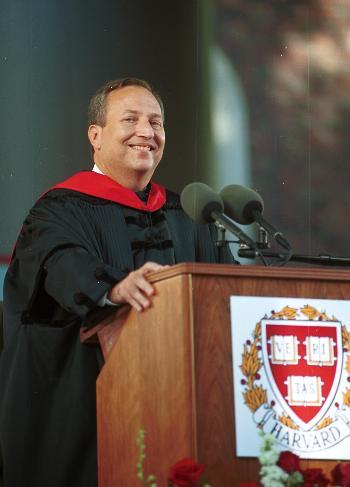
University President LAWRENCE H. SUMMERS delivers his installation address at Friday's ceremony in Tercentenary Theatre.
Previously circumspect University President Lawrence H. Summers ended his silence Friday, laying out in the most detailed terms yet his vision for Harvard University.
In his inaugural speech, Summers confirmed points that had long been rumored to figure prominently on his agenda—undergraduate education and the development of a new campus in Allston—but also introduced new goals such as improving graduate student financial aid.
Summers took a strong line on such perennial issues as integrating the University and pushing forward with technology.
He addressed a varied audience, making some points that drew wide applause from the undergraduates seated at the back of Tercentenary Theatre, while offering others that were clearly aimed at the administrators and faculty who were his captive audience on the stage.
And in speaking about Harvard’s role as a preeminent institution of higher education, Summers’ message was clearly aimed at the wider world beyond the University.
Little of what Summers said was patently controversial, but he pushed the margins in outlining an ambitious and surely difficult to achieve agenda.
The Undergraduate
Given the attention Summers had paid to College students since he took over in July, it was not unexpected that issues of undergraduate education figured prominently in his speech.
Much of what Summers said was in line with earlier indications of where his impulses lie. Summers said interactions between faculty and students were of prime importance and said definitively that he would look to expand the size of the faculty to make this not a possibility, but a probability. Delving further into the issues of where he will hope to effect change at the College, Summers explained that among his priorities were “assuring that the academic experience is the center of the college experience.”
Summers also stressed the need to constantly revise and improve curricula.
A Mass. Hall source explained that Summers hoped to signal a significant change in laying out these plans—both with regards to specific needs and culture. Making the academic experience the center of the College experience, the source said, means extending intellectual pursuits beyond the classroom and harnessing the excitement students get out of their extracurricular activities for academic purposes.
The source said specific initiatives, such as making study abroad more accessible or providing opportunities for undergraduate students to do research, will help to reinforce academic culture. The source stressed, however, that Summers values the contributions extracurriculars make to the undergraduate experience.
But other well-placed sources indicated that while Summers does value extracurriculars, he is concerned that they might detract from the academic mission. Summers, they said, feels the academic culture should be stronger, the work tougher and extracurriculars subordinate.
Such a change to the culture of the University would likely not come without resistance. In his letter to first-years at the end of the summer, Dean of the College Harry R. Lewis ’68 urged students to slow down, and in other contexts has encouraged students to take advantage of their extracurricular opportunities.
Professor of Education Richard J. Light, who has done research on undergraduate experience and has a number of strong supporters within the College, said he thought Summers was reacting to the fact that though Harvard is seen as the top college in many respects, students at other elite schools sometimes describe their academic experience as more intense.
Read more in News
Law School To Produce ‘The Crucible’












